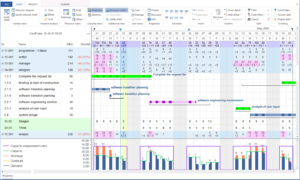In the fast-paced world of manufacturing, efficient and effective scheduling is paramount to ensure smooth operations, timely deliveries, and optimum resource allocation. Traditionally, manufacturers relied on manual methods or spreadsheet-based systems for scheduling their production processes. However, these methods often fall short when it comes to managing the complexities of modern manufacturing environments. This is where work scheduling software steps in as a game-changer. In this article, we will explore the key benefits that manufacturers can reap by implementing work scheduling software.
Optimizing Resource Utilization
Work scheduling software provides manufacturers with powerful tools to optimize resource utilization across various production lines and shifts. By having a centralized system that takes into account factors such as machine availability, employee skills and availability, material availability, and order deadlines; manufacturers can create schedules that maximize efficiency while minimizing downtime or idle resources.
With automated algorithms and real-time data integration, work scheduling software enables accurate forecasting, capacity planning, and labour optimization.
By ensuring optimal utilization of resources, manufacturers can reduce costs associated with overstaffing, minimize equipment idle time, and improve overall productivity.
Real-Time Visibility into Production Processes
One significant advantage of work scheduling software is its ability to provide real-time visibility into ongoing production processes. Manufacturers can track each step of their operations, from raw material procurement to finished product delivery, all within a single interface. This level of transparency allows businesses to identify bottlenecks, monitor progress against targets, and proactively address any issues that may arise. Real-time visibility also facilitates better decision-making. Managers can make informed choices based on up-to-date information, such as identifying potential delays, reassigning tasks, or adjusting priorities. Having access to real-time data empowers manufacturers to take corrective actions promptly, avoid costly disruptions, and maintain high levels of customer satisfaction.
Efficient Order Management and On-Time Deliveries
Work scheduling software plays a critical role in ensuring on-time deliveries by streamlining the order management process. With automated scheduling algorithms,
manufacturers can prioritize orders based on customer deadlines, resource availability, and production capacity. This allows businesses to manage their order backlog effectively, optimize delivery schedules, and meet customer expectations.
By reducing lead times, minimizing delays, and improving overall order fulfilment efficiency, work scheduling software helps manufacturers establish a reputation for reliability and timeliness.
Improved Collaboration and Communication
Effective collaboration and communication are vital within manufacturing organizations to ensure smooth operations across different departments, shifts, or even locations. Work scheduling software provides a centralized platform where relevant stakeholders can access real-time schedules, make updates or adjustments as needed, and communicate with each other seamlessly. By eliminating manual handoffs, paper-based systems, or spreadsheets, work scheduling software enables faster information sharing, reduces miscommunication or errors caused by outdated data, and promotes cross-functional collaboration. Manufacturers gain improved visibility into workloads across various teams, facilitating better coordination between departments such as production, inventory management, quality control, or logistics.
Flexibility to Adapt to Changing Demand
In today’s dynamic market landscape, manufacturers need agility to respond quickly to changing demand patterns or unforeseen events. Work scheduling software offers the flexibility required for adapting production plans in real-time. With features like drag-and-drop rescheduling, scenario modelling, and what-if analysis manufacturers can easily adjust schedules to accommodate rush orders, changes in material availability, equipment breakdowns, or changes in customer requirements. This ability to adapt quickly ensures that businesses remain nimble in fulfilling customer demands while maintaining operational efficiency.
Data-Driven Insights for Continuous Improvement
Another significant benefit of work scheduling software is its ability to generate valuable insights through data analytics. Manufacturers can leverage the data captured by the software to identify trends, bottlenecks, or areas for improvement.
By analysing historical production data, identifying patterns, and conducting root cause analysis, manufacturers can make informed decisions to optimize their scheduling processes, improve resource allocation strategies, identify opportunities for automation, or implement lean manufacturing principles.
Data-driven insights empower manufacturers to continuously improve their operations and drive efficiency gains over time.
Work scheduling software offers numerous benefits for manufacturers seeking to streamline their operations and maximize productivity.
From optimizing resource utilization and providing real-time visibility into production processes to enabling efficient order management and promoting collaboration across teams, the advantages of implementing work scheduling software are undeniable.
Manufacturers that embrace this technology gain a competitive edge in an increasingly complex industry landscape. So whether you’re a small-scale manufacturer looking to enhance operational efficiency or a large enterprise aiming to achieve just-in-time production capabilities, investing in work scheduling software is a strategic decision that paves the way towards improved performance, customer satisfaction, and long-term success.































